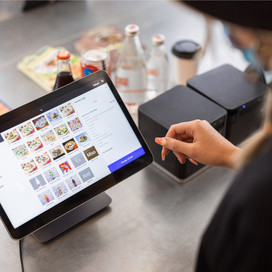Table of contents
12 Tips for Successful Retail Store Management
The retail landscape has changed drastically in the last 20 years. As technology evolves, we’ve seen more people shopping online rather than in brick and mortar stores. While this isn’t necessarily a bad thing, because traditional retail stores can embrace the eCommerce trend too, it has definitely shaken up the retail world.
Most significantly, it’s created more competition, so in order to compete in the modern world of retail, you need terrific store management. From product placement and store layout to the use of data when making business decisions, it’s never been more important to manage a retail store well.
Importantly, retail store managers need to remember that technological advancements can give you a serious advantage, rather than be a hindrance to your retail operations. Let’s take a deeper look at retail store management, why it’s important, and how you can drive your business further.
What is retail management?
Effective retail management takes more than understanding retail terminology and selling products. Successful store management requires a range of different skills, and you’ll often need to wear several hats. Retail management involves sales, scheduling, inventory control, reporting, team management, conflict resolution, hiring, performance management, staff training and much more.
Benefits of retail management
There are plenty of benefits to quality retail management, including:
- Increased sales and revenue
- Building efficient processes
- More engaged staff
- Reduced staff turnover
- Business growth
- Increased customer satisfaction and loyalty
These are just a few of the things that happen when you manage a retail environment well. Let’s look at some helpful tips on how to be successful in retail management.
12 Retail management tips
Use these tips to help you become a better, more effective retail manager.
1. The importance of goal setting
Setting goals is crucial for any leader, and it’s a skill you can pass on to your team members too. Whether you own the store or manage it for someone else, you’ll always have targets to achieve. Usually these targets are around sales, but there are plenty of other goals you can set yourself.
From reducing staff turnover to increasing customer satisfaction, your business will benefit from goals in order to achieve overall success. Take the time to share your goals with employees, and help them set goals for themselves. This builds a teamwork-first culture.
2. Make use of data
Data is the best friend of any business owner, and that applies to retail stores too. Once you’ve set your goals, you need to monitor your progress. There are plenty of tools to help you do that including Square for Retai, for example, is an all-in-one POS solution with plenty of benefits, but it also gives you access to sales data, trends and forecasting.
Data helps you see what customers are buying, which days your business is busiest, whether you’ve got staffing levels correct and other information that’s crucial to running your retail business.
3. Embrace new technology
While we’re on the topic of business tools and data, it’s important that you embrace technology willingly. Technology drives business, and retail is no exception. For example, how do you keep track of staffing levels and employee hours? With an easy-to-use system like Square Team Management, you can manage your staff in one convenient place. Keep track of hours, adjust rosters and obtain valuable analytics to help you plan accordingly.
There is also other business software you’ll need to get familiar with, such as a POS system, accounting software, and of course digital forms of customer engagement such as your website and social media accounts. Make technology your friend in retail.
4. Develop sound recruitment strategies
There’s a lot to be said for hiring the right people in retail. It’s not always easy, and you can’t always predict how good an employee will be. There’s also no right or wrong thing to look for. It just has to suit your business and your goals.
In retail, it’s often better to hire based on attitude and personality, rather than experience and qualifications. You can always train someone to perform tasks, but you can’t always teach personality and a strong work ethic. Develop the hiring strategies that work for your business, and stick to them.
5. Focus on staff onboarding
Once you’ve hired your staff, it’s worth having a clear onboarding process. This includes training them in your POS system, familiarising them with rostering requirements, and also ensuring they have everything they need to hit the ground running. From uniforms to software permissions, everything should be ready for them on day one so you can get straight down to work and training.
6. Recognise staff efforts
Staff recognition is important in any business, but it often gets overlooked in the fast-paced retail environment. You don’t need to have lavish ceremonies to reward people’s work, but delivering praise when appropriate is important. If you notice a staff member going above and beyond, let them know that you’ve noticed and that you appreciate it.
7. Learn to delegate tasks
Delegation can be difficult for many managers. The presiding thought is that it will take too long to teach someone a particular task, so you may as well just do it yourself. That might be true for a one-off task, but being a good manager is about identifying ways to free up your time and empower your staff to grow So, if you have regular tasks that could be better handled by a member of your team, start training them accordingly.
This not only gives you more time but also shows your team members that you trust them with extra responsibility.
8. Lead by example
All workplaces are only as effective as their manager. Often, the way you work and behave is picked up by your team and that’s the culture you’re stuck with. So, if you want to inspire your team to perform well, make sure you exhibit positive behaviours and a strong work ethic. It can really rub off on your employees.
9. Get to know your employees
Speaking of your employees, take the time to get to know them. It may not seem important to know your employees’ children’s names or the type of dog they have, but it is. Everybody has a life outside the workplace, and it shows good leadership to take an interest in your team. It builds trust, fosters a positive workplace culture, and it even makes it easier for you when managing schedules if you understand an employee’s needs outside of the workplace
10. Stay calm in high-pressure situations
Anybody who says retail isn’t stressful has never worked a Boxing Day sale or a Christmas Eve. There are stressful situations all the time in retail store management, and these require a leader who can remain calm under pressure. Whether it’s running out of stock, being short-staffed or dealing with particularly irate customers, there are plenty of occasions where you’ll need to keep your cool.
Ultimately, your staff model the environment you create, so if you’re constantly stressed or rattled by the unexpected, your staff will be too.
11. Involve staff in decision making
You may have the management experience that your staff don’t, but that doesn’t mean they can’t contribute to decision making. The truth is, your staff may sometimes have more current operational knowledge than you. They’re on the floor everyday, talking to customers. They hear the complaints, and they also understand what people love about your store. As such, they’re an incredible source of information for the bigger decisions you need to make.
Take the time to meet with your staff. Ask them for ideas and other information about day-to-day operations. What’s working well? What do they think could improve in the long-term? Most importantly, follow up on your staff’s ideas. You don’t have to implement every single suggestion, but if you don’t, let them know why, because it’s important they feel their opinion matters. It’s also a great way to teach them more about the decision-making process of retail management.
12. Identify trends
Being able to identify trends is crucial to your success in shop management. Of course, there are retail technology trends that you should be aware of, such as providing customers with the opportunity to order online or schedule pick-ups. But it’s also about the smaller trends you see on a daily basis. Be observant, because things that are happening in your store may help you identify trends that nobody else has noticed.
Is your customer demographic changing? Perhaps a new audience is gravitating towards your products. Are certain parts of the store attracting more attention than usual? Are customers who buy a certain type of item also interested in other specific products? All of these trends can help you better manage your store layout and maximise your sales potential.
Overall, you need a range of different skills to run a retail store. The tips above present a great platform for success, and with the right tools and mindset, you can go a long way in retail store management.
![]()











